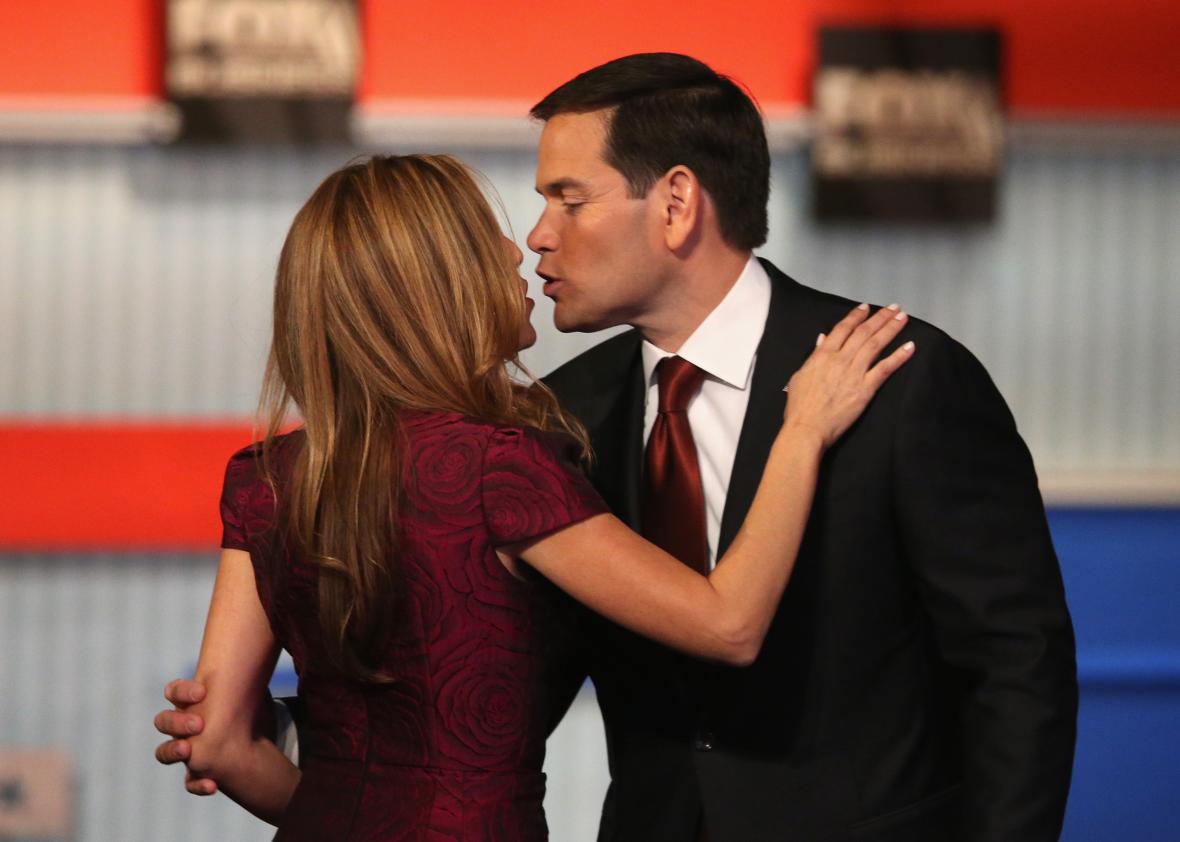When I was in the sixth grade, I noticed that my male classmates were beginning to take on stereotypically masculine interests. As puberty drew closer, the boys seemed unable to talk about anything except football, girls, and cars. I, a gentle and effete mama’s boy, could not bring myself to feign interest in football, and any talk of girls made me feel like a grotesque fraud. But one day at the lunch table, when the most popular kid in the class asked me what my favorite car was, I knew my moment had arrived. I racked my brain for the coolest, sexiest, manliest car I could think of, a car that would prove the authenticity of my masculinity, then gruffly barked my answer: the PT Cruiser.
I was reminded of this regrettable incident while reading Jeremy Peters and Michael Barbaro’s latest New York Times profile of Florida senator and Republican presidential candidate Marco Rubio. The article, titled, “Boots? Marco Rubio Wants to Talk Guns and Football,” details Rubio’s attempt to bounce back from criticisms that his boots are insufficiently masculine. The $135 boots in question were apparently objectionable because they featured heels, a fact which Rubio’s rivals immediately seized upon. Rand Paul sent out a dog whistle and mocked the boots as “cute.” Jeb Bush’s super PAC made a terrible video featuring a fake Rubio shimmying flamboyantly in a lookalike pair. Ted Cruz’s communications director wrote that “A Vote for Marco Rubio Is a Vote for Men’s High-Heeled Booties.” As my colleague Jim Newell wrote at the time, you might call this the Rubio’s shoes are gay angle.
Peters and Barbaro explain that, following the boot affair, Rubio’s rhetoric on the campaign trail become noticeably more masculine. (Remember, in this crowd, masculinity equals heterosexuality, and vice versa.) The candidate has upped his guy talk, musing about his love of football. He has taken to reminding audiences that he married a (female!) Miami Dolphins cheerleader. Last week, he revealed that he bought a gun on Christmas Eve to protect his family from ISIS. And he has recently added a line to his stump speech that implies he would torture alleged terrorists. “Mr. Rubio,” the article concludes, “is radiating machismo.”
Many people find Rubio’s attempts to establish himself as a deeply heterosexual alpha male amusing. I find it sad. Rubio has essentially allowed his rivals to bully him into adopting a persona that is, quite obviously, uncomfortable for him. A well-groomed and soft-spoken man, Rubio is just a little too pretty to pull off the tough guy attitude. I do not mean to suggest that Rubio is gay—I am certain he is not—but rather that his stabs at machismo fall painfully flat. His line readings are somehow both halting and rushed, his voice repeatedly rising to its natural, lilting pitch before he consciously forces it down an octave. Listening to him talk about buying a gun, I heard echoes of my prepubescent self, professing admiration for the ugliest car of the aughts.
Rubio is surrounded by candidates who come across as stereotypically masculine, in ways both obnoxious (Chris Christie’s pugilist act) and gross (Jeb Bush, always something of a creepy uncle, calling Supergirl “pretty hot”). The senator’s slightly more cordial, delicate persona once helped to differentiate him from the pack. Now, in a lamentable effort to prove he is tremendously macho and definitely not gay, Rubio has become just as bland and awkward as his adversaries. His unconvincing impersonation of a generic butch dude is depressingly pathetic. Let the poor man wear his high-heeled boots in peace.
